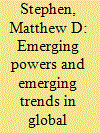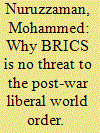| Srl | Item |
| 1 |
ID:
154716


|
|
|
|
|
| Summary/Abstract |
In the 1990s, liberal optimism permeated the study and practice of international politics. International institutions were strengthened and the discourse and practice of global governance consolidated as a new approach to world affairs. Today, new powers are emerging in this institutionalized order. New powers have changed the power relations that underpinned global governance and are also economically, politically, and culturally different from established powers. Against this backdrop, this article investigates the impacts emerging powers are having on global governance. It presents six major trends and outlines their implications for the new global governance currently taking shape. Because new powers are emerging in an already institutionalized order, the emerging global governance order is gradually growing out of the existing one. Emerging powers are rendering parts of global governance dysfunctional, layering onto it, complicating it, but not overthrowing it.
|
|
|
|
|
|
|
|
|
|
|
|
|
|
|
|
| 2 |
ID:
170653


|
|
|
|
|
| Summary/Abstract |
BRICS (Brazil, Russia, India, China and South Africa) has emerged as a powerful economic group in the global economy and politics, apparently posing threats to the survival of the post-war liberal world order. Its member states (Brazil, Russia, India, China and South Africa) are seeking to democratize the post-war liberal world order to increase their shares of voting power in the decision-making processes of the Bretton Woods institutions and thus curb the USA’s dominance over global economic and financial architecture and eventually overhaul the US-led liberal world order. Contrary to the fear of many Western policymakers and analysts, this article contends that BRICS poses no credible threats to the US-led post-war order. The BRICS group’s potential to challenge or threaten the US-led world order is seriously undermined by the internal make-up of the group, its political and ideological heterogeneity, its incapacity to develop a collective world order vision salable to the wider international community and the lack of strong convergence in foreign policy goals and preferences.
|
|
|
|
|
|
|
|
|
|
|
|
|
|
|
|